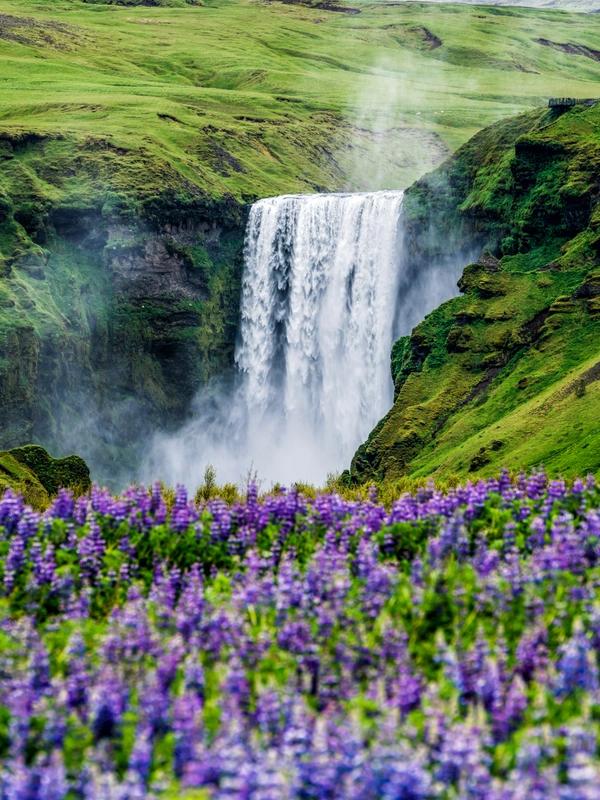
The Best Time to Go to Iceland: A Season by Season Guide
Wondering when to visit Iceland? Whether you want the Midnight Sun, Northern Lights, or fewer crowds, this guide breaks down Iceland’s seasons, weather, and best travel times.
When Is the Best Time to Visit Iceland?
The best time to visit Iceland depends on what you want to experience. For long daylight hours and warm weather, visit in summer (June–August). For Northern Lights and snowy landscapes, winter (November–March) is ideal. Spring (April–May) and autumn (September–October) offer fewer crowds, lower prices, and a mix of both summer and winter experiences.
Weather plays a big part in Icelanders' lives, and over the years, the population here has learned to live with the extreme yet beautiful conditions that shape the island. When planning a trip, it’s essential to choose the season that best fits your travel goals – whether that’s hiking under the Midnight Sun, seeing the Northern Lights, or driving Iceland’s famous Ring Road.
Each season has its advantages and challenges. Read on for a breakdown of what to expect in Iceland during each season, including weather, daylight hours, and road conditions.
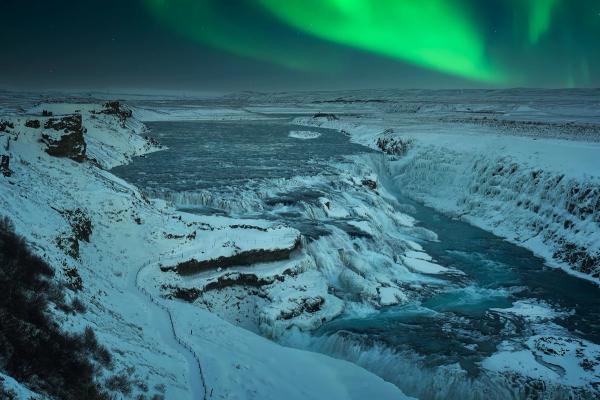
Summer in Iceland (June – August)
- Peak Season Prices
- Best for: 4x4 Highland Adventures, Midnight Sun, Puffins and Whales, Hiking, Road Trips
Summer is the most popular time to visit Iceland, and for good reason. The Midnight Sun means nearly 24 hours of daylight, the highland roads open, and wildlife is at its peak. Whale-watching tours operate in full force, puffins nest in massive colonies, and the entire country is alive with festivals, hiking, and adventure.
For road trips, summer is the easiest and safest season. You won’t have to worry about icy roads or sudden blizzards, and nearly every campsite, guesthouse, and attraction is open. The downside? It’s also the busiest and most expensive time to visit. However, with endless daylight, you can adjust your schedule to explore Iceland’s most famous sights during the quieter early morning or late evening hours.
Summer 2026 will be a great time to visit because of the Solar Eclipse that will take place in August. Iceland is one of the prime locations to witness it.
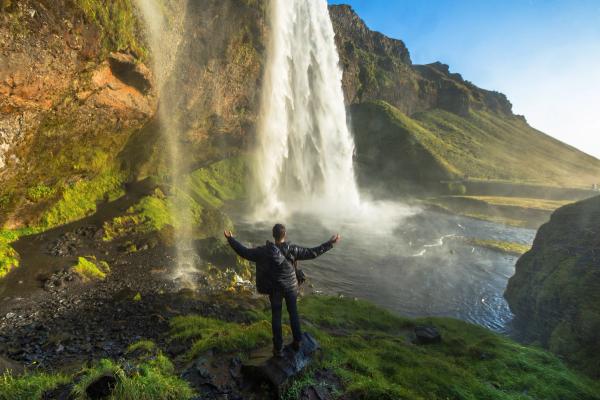
How warm does Iceland get in summer?
Despite its proximity to the Arctic Circle, Iceland in summer is mild and comfortable, though temperatures will vary depending on the region.
- June: 8°C to 13°C (46°F - 55°F)
- July: 10°C to 15°C (50°F - 59°F)
- August: 8°C to 14°C (46°F - 57°F)
In South Iceland (Reykjavik, Vik, Golden Circle), temperatures occasionally reach 15–20°C (68-77°F) on rare hot days. However, the highlands and northern regions remain cooler, and temperatures drop sharply at night, especially in the mountains.
How much daylight does Iceland get in summer?
Summer in Iceland is defined by the Midnight Sun, where the sun barely sets below the horizon.
- June: 20-24 hours of daylight (Midnight Sun peaking around June 21st, the Summer Solstice)
- July: 18-20 hours of daylight, sun dipping below the horizon but never getting fully dark
- August: 15-16 hours of daylight, gradually losing the 24-hour daylight effect
This endless daylight is fantastic for exploring at odd hours and avoiding the crowds that flock to Iceland in summer.
Does it rain in Iceland in summer?
Iceland experiences less rainfall in summer compared to autumn and winter, but rain is still common, especially on the South Coast and in Reykjavik.
- June: 40 mm (1.6 inches)
- July: 50 mm (2 inches)
- August: 65 mm (2.6 inches)
While summer brings more dry and sunny days, weather in Iceland is always unpredictable. Rain showers can appear suddenly, often accompanied by strong winds, before clearing up just as quickly. The South Coast tends to be wetter than the north and the highlands, so waterproof gear is still essential, even in the summer months.
Is it easy to drive in Iceland in summer?
Yes – summer is the safest season for road trips. Roads are dry and clear, and all F-roads (mountain roads to the highlands) are open from mid-June to early September.
Can you see puffins in Iceland in summer?
Yes! Summer is the best season to see puffins in Iceland. They arrive in late April and stay until mid-August, nesting on sea cliffs in locations like the Látrabjarg Cliffs in the Westfjords, Dyrhólaey and Vestmannaeyjar in South Iceland, and Borgarfjörður Eystri in the east.
By mid-August, puffins begin leaving Iceland, with only a few lingering into early September.
Autumn in Iceland (September – October)
- Shoulder Season Prices
- Good for: Hiking, Northern Lights, Picking Wild Berries, Whale Watching
Autumn in Iceland is a season of dramatic transformations. As the midnight sun fades, the golden hues of summer give way to deep reds, oranges, and fiery yellows, painting the moss-covered lava fields and mountains in stunning autumnal colors. Summer crowds begin to thin out, making it one of the best times to visit for those wanting fewer tourists and a mix of both summer and winter experiences.
This is also the beginning of the Northern Lights season, with longer nights and clearer skies than winter. It’s the perfect time for outdoor adventures, whether you’re hiking, exploring waterfalls, or taking in the surreal landscapes without worrying about heavy snowfall or summer crowds. However, Icelandic weather in autumn is unpredictable – you’ll likely experience both sunny days and intense rainstorms in the same trip.
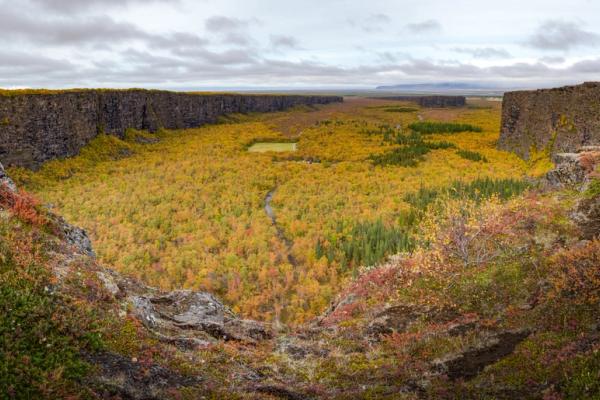
How cold does Iceland get in autumn?
Autumn in Iceland starts off mild but gradually cools as winter approaches. Temperatures vary across the country, with coastal areas staying warmer while the highlands and northern regions experience early snowfall.
- September: 4°C to 10°C (39°F - 50°F) – Still relatively mild, with crisp mornings and cool evenings.
- October: 0°C to 7°C (32°F - 45°F) – Noticeably colder, especially in the north and highlands.
Icelandic autumn weather is unpredictable – clear, sunny days can quickly shift to rain and strong winds. By late October, the first snowfalls of the season often arrive, particularly in the north and at higher elevations.
How much daylight does Iceland get in autumn?
Autumn sees the days swiftly getting shorter, with the dark evenings returning as the season moves on.
- September: 13-14 hours of daylight
- October: 9-11 hours of daylight
By mid-October, sunsets occur before 6 PM, making it one of the best seasons for Northern Lights hunting.
Does it rain in Iceland in autumn?
Yes – September and October are among the wettest months in Iceland.
- September: 85 mm (3.3 inches) of rainfall
- October: 80 mm (3.1 inches) of rainfall
The South Coast and Westfjords tend to get the most rain, while the north and highlands are generally drier.
Is it safe to drive in Iceland in autumn?
Barring any autumn storms, driving is still manageable across the whole country in Autumn. But expect strong winds and occasional early snowfall in the north. Main roads remain open, but F-roads (mountain roads) begin closing in late September.
Can you see the Northern Lights in Iceland in autumn?
Yes, the northern lights begin appearing in the skies above Iceland as early as the end of August. September and October both offer fantastic opportunities to see the Northern Lights.
Winter in Iceland (November – Early March)
- Low-Season Prices
- Good for: Northern Lights, Ice Caves, Winter Sports, Christmas & New Year's Eve
Winter in Iceland is a season of extremes, with snow-covered volcanoes, frozen waterfalls, and deep blue ice caves creating some of the most breathtaking landscapes on Earth. The sun barely rises in December, casting a soft, golden glow over the frozen tundra, while the Northern Lights dance in the sky during long, dark nights.
This is the time for adventurous travelers – those who embrace the cold and unpredictable weather in exchange for a true Arctic experience. While storms, snowfall, and icy roads can make travel challenging, Reykjavik in winter is magical, with Christmas lights twinkling over the city and festive markets filling the streets.
If your primary reason to visit is to see the Northern Lights, 2026 is the year to go, as it is set to be the best in Aurora viewing in the last decade, thanks to something called "Solar maximum."
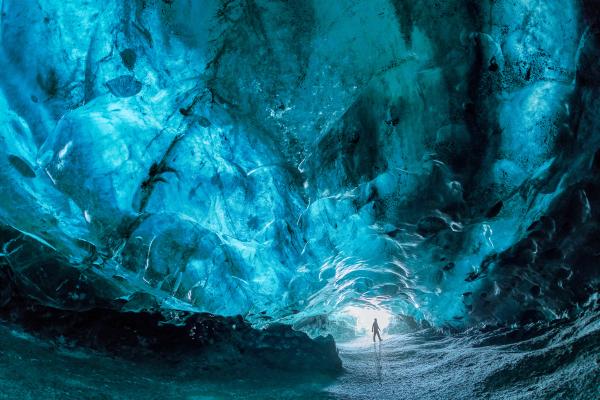
How cold does Iceland get in winter?
Winter temperatures in Iceland are milder than many expect, thanks to the Gulf Stream.
- November: 0°C to 4°C (32°F - 39°F)
- December - January: -2°C to 3°C (28°F - 37°F)
- February - Early March: -1°C to 5°C (30°F - 41°F)
How much daylight does Iceland get in winter?
Winter in Iceland is the darkest time of the year, with short daylight hours and long nights. The shortest days occur in December, when the sun barely rises above the horizon, casting a golden twilight glow over the country’s landscapes.
- November: 5-7 hours of daylight
- December: 4-5 hours of daylight (Winter Solstice around December 21st)
- January: 5-7 hours of daylight
- February: 7-10 hours of daylight
While the lack of daylight might seem daunting, the extended nights increase the chances of seeing the Northern Lights, especially in rural areas with little light pollution. The soft winter light during the daytime also makes for incredible photography, with long sunrises and sunsets stretching across the sky.
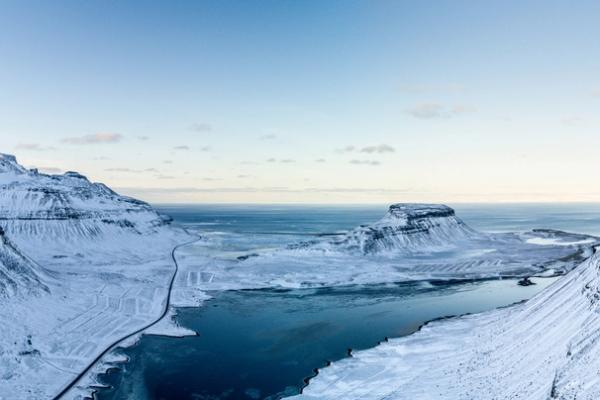
How much snow does Iceland get in winter?
Snow is a regular part of Icelandic winters, but how much you’ll see depends on where you are.
- Reykjavik & the South Coast: Snow falls often but doesn’t always stick around for long. Thanks to the coastal climate, you’ll get a mixture of snow, rain, and sleet throughout winter. December and January tend to be the snowiest months, but it can just as easily be pouring rain.
- North Iceland & the Westfjords: The snowiest parts of the country. Here, winter kicks off early – snow can start falling as soon as October and last well into May. Places like Akureyri and Ísafjörður see heavy snowfall, and roads can be blocked for days at a time after big storms.
- The Highlands: Forget about driving here in winter – the highlands are completely buried under snow from late autumn until spring, with roads staying closed until the melt.
Is driving in Iceland in winter difficult?
Driving in winter requires a lot of caution. Snowstorms and ice are common, and high winds often create whiteout conditions, making driving dangerous and forcing road closures. If you're traveling in winter, check the weather and road conditions daily – storms can roll in fast, and you don’t want to get caught in one.
Can you drive the ring road in Iceland in winter?
Yes, but it requires caution. The Ring Road is open year-round, but snowstorms, high winds, and ice can make driving difficult, especially in the north and east. No-travel warnings are also put out in dangerous weather, which can often make sections of the ring road impassable.
Spring in Iceland (Late March – May)
- Shoulder Season Prices
- Good for: Puffins, Whale Watching, Hiking, Longer Days for Exploring, Waterfalls
Spring in Iceland feels like a rebirth. Snow begins to melt, revealing green moss-covered landscapes beneath, and wildflowers start to bloom. Waterfalls swell with glacial meltwater, and puffins return to the cliffs, kicking off the best birdwatching season of the year.
It’s also an excellent time for budget-conscious travelers, as prices are lower than summer, but you still get long daylight hours and excellent hiking weather.
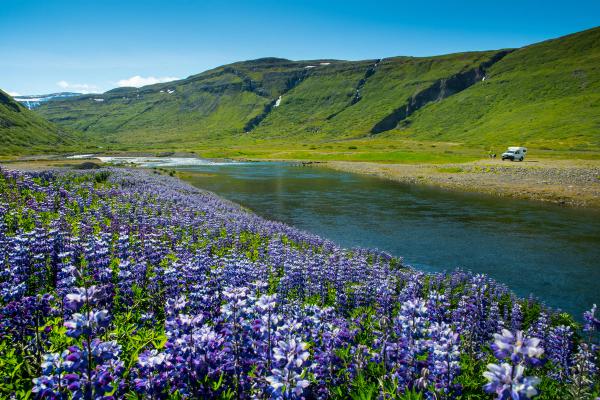
How cold does Iceland get in Spring?
Spring in Iceland usually begins as an extension of winter, with temperatures gradually warming up only towards mid-April and May:
- March: 0°C to 5°C (32°F - 41°F)
- April: 2°C to 7°C (36°F - 45°F)
- May: 5°C to 11°C (41°F - 52°F)
How much daylight does Iceland get in spring?
Spring in Iceland is characterized by the days growing longer each week in the lead up to the Summer Solstice in June.
- March: 10-13 hours of daylight.
- April: 14 – 16 hours of daylight.
- May: 17-20 hours of daylight, almost never getting fully dark.
Does it rain in Iceland in spring?
Yes – spring in Iceland can still be wet, though rainfall gradually decreases as the season moves toward summer.
- March: 85 mm (3.3 inches) of precipitation. The South Coast and Reykjavik see the most rain, while the north and highlands may still get snowfall instead.
- April: 55 mm (2.2 inches), but spring storms can still roll in, bringing occasional late-season snow.
- May: 50 mm (2 inches), one of the driest months of the year, especially in the north and east.
While the weather is improving, Iceland’s famous unpredictability means you should still pack waterproof layers – rain, wind, and even brief snow flurries can all happen in the same day.
Is it safe to drive in Iceland in spring?
Yes – spring is one of the easiest seasons for driving in Iceland, but conditions vary depending on where you go.
By late March and April, most main roads, including the Ring Road, are clear of snow and ice, making general travel much easier than in winter. However, the highland roads (F-roads) remain closed well into late spring. As the snow melts, these roads are constantly monitored, and driving on them too early can cause serious damage to the soft, waterlogged terrain. Most highland routes don’t open until mid-to-late June.
When can you see puffins in Iceland in spring?
Puffins start making their way back to Iceland in mid-to-late April, with the first birds appearing along the cliffs after months spent out at sea. By early May, colonies start filling up, and by the end of the month, they’re fully settled in, ready for the nesting season.
If you're visiting Iceland in spring, these are some of the best places to see puffins:
- Vestmannaeyjar (Westman Islands) – One of the largest puffin colonies in Iceland.
- Látrabjarg Cliffs (Westfjords) – Steep sea cliffs packed with puffins by late May.
- Dyrhólaey (South Coast) – A great, easy-access puffin spot from early May onward.
- Borgarfjörður Eystri (East Iceland) – One of the most reliable puffin-viewing locations.
While summer is peak puffin season, spring visits mean fewer crowds and the chance to see these little birds reunite with their mates, start burrowing, and get ready for a busy few months of raising their chicks.
| Season | Best for | Challenages | Avg. temperature | Daylight hours |
| Summer (Jun–Aug) | Road trips, Midnight Sun, puffins | Expensive, crowded | 8–15°C (46–59°F) | 15–24 hrs |
| Autumn (Sep–Oct) | Northern Lights, fewer tourists | Rainy, unpredictable weather | 0–10°C (32–50°F) | 9–14 hrs |
| Winter (Nov–Mar) | Ice caves, Northern Lights | Extreme weather, icy roads | -2–4°C (28–39°F) | 4–7 hrs |
| Spring (Apr–May) | Cheaper travel, waterfalls at peak, lupines | Unpredictable weather | 0–11°C (32–52°F) | 10–20 hrs |
So, When’s the Best Time to Visit Iceland?
If you’re looking for a mix of long days, quiet roads, and nature coming back to life, late April and early May offer what we think is a fantastic balance. But really, there’s no single ‘best’ time, just the best time for you, with different seasons all coming with pros and cons. Summer brings endless daylight and easy road trips, autumn glows with golden moss and Northern Lights, winter is all about snow-covered landscapes and cozy nights.
No matter when you visit, Iceland will do what it does best – throw a little bit of everything your way. Expect stunning landscapes, unpredictable weather, and moments that stop you in your tracks. Pack your layers, stay flexible – embrace whatever Iceland throws your way. That’s half the adventure.

